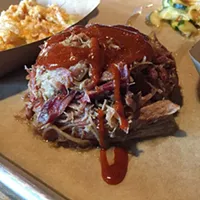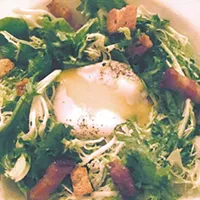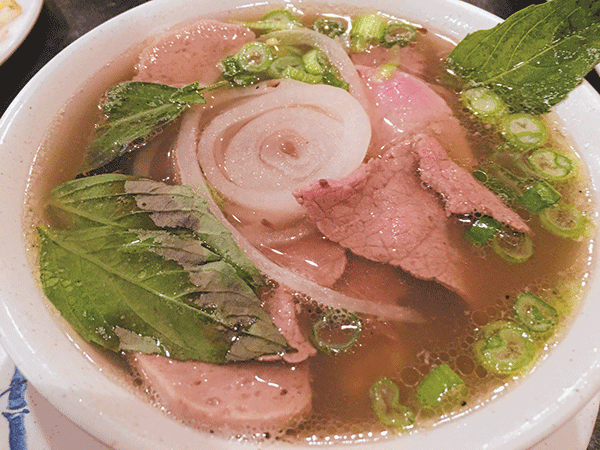If you think you've finally got your mind around all the various Chinese cuisines currently available in Charlotte -- Sichuan, Taiwanese, Cantonese, Hunan, Mongolian -- add one more: enter Indochinese. This term can be confusing since Indo-China was the incorrect term used for Vietnam, thus many Americans assume Indochinese food emanates from the Southeast Asia peninsula. It does not.
Indochinese is a hybrid cuisine developed by the ethnic Chinese who immigrated to India. In India, this cuisine is referred to as merely Chinese, but outside of Indian this cuisine has become known as Indochinese, a blending of Chinese cooking techniques with Indian style and spices. A good analogy is Tex-Mex, a Mexican-American amalgam which is neither Mexican nor Texan, but is now a unique culinary category.
Restaurateurs Fu Chen and Francis Lin opened their namesake restaurant, the 79-seat Fu Lin Asian Cuisine Indo Chinese Fusion in April 2006. Both Chen and Lin were born in Kolkata (formerly Calcutta), India, as their parents had been, but their ancestors were Hakka, or the Han people of China, who for generations migrated across Asia.
Before immigrating to the United States, Chen, who is also a registered nurse, learned the ropes of the hospitality industry in the luxurious, five-star Oberoi Hotel chain in India. The decision to open an Indochinese restaurant in Charlotte was simple. Chen explains, "I work with many Indian doctors in the hospital, and they would tell me they drive five hours to Atlanta for Indochinese food. I figured if they would drive five hours, they could drive from Ballantyne to Independence."
Evidently they have. Fu Lin is a vibrant restaurant filled with Indian and Pakistani expats and their families. The menu is a revelatory history of Chinese migration. Chen said, "Our Chinese food is modified to the taste of the Indian people. We use Thai peppers, garlic, ginger, and curry as the main ingredients." And noodles. Don't forget the noodles.
You won't find ho hum Dim Sum or five-spice Chicken Tikka here. Since India's original Chinese immigrants were from northern China, the tag Manchurian still stands to describe many Indochinese dishes, no matter what their actual origin is. At Fu Lin, the Manchurian chicken is prepared with garlic, cilantro, and Thai peppers. In fact, chopped Thai peppers in vinegar are the most popular condiment on the table. One neighboring patron poured the remaining peppers from the jar and asked for his server a refill. When the server returned, the patron added more peppers to his noodle dish. According to the Scoville heat index, Thai peppers are about 10 times hotter than jalapeños. That's packing some heat.
Although pork is a popular meat in China and for the Hakka people, Chen and Lin made the decision six months ago to discontinue pork dishes and at the same time offer halal meats. Halal, which means permitted in Arabic, refers to foods that are allowable under Islamic law. Halal is similar to (but not the same as) the Hebrew term kosher. Foods that are not permitted under halal include pork and any animal slaughtered incorrectly. Halal chicken and beef are offered for $1 more at Fu Lin. Even though alcohol consumption is forbidden in Islam, Fu Lin does offer a limited selection of wines and beers, including Indian beers.
Fu Lin's small room bears a scattering of bamboo and Chinese wall coverings, nothing too serene or Zen-like. Tabletops are bare and packed together; chairs are low-slung and functional.
The all-English menu contains more than a dozen appetizers, a vegetarian section, and entrees offered in two sizes. The intensively flavored recipes work well. We sampled a platter of sweetly perfumed steamed chicken dumplings, a row of crispy vegetable pakoras touched with a cilantro scented chili sauce, and the flash fried, but tender, beef satay skewers tasting of curry before being plunged into a heavy peanut sauce. Chicken lollipops (fried wings) sing of ginger, garlic, turmeric, and cilantro.
Entrees arrived in aluminum wok-shaped serving bowls and are passed around the table (thankfully another cuisine where dishes are shared). The gravy of the ginger beef sparked with a garlic, ginger, chili medley. We requested medium heat, which delivered a full mouth punch. There's no dumbing down of the cuisine here. Order the Indian-styled chicken curry and it comes to the table in glorious gravy, but without naan to sop. The stir-fried Singapore rice noodle dish was straightforward: chicken, turmeric, and chilies.
If the fire of the peppers in the entrées needs extinguishing, order one of the cold, creamy, and smoothing Indian-styled desserts, a perfect balance.
Dinner entrees range from $6 for the Thai Green Curry to $15 for the Szechuan shrimp stir-fry; however, most dishes cost less than $10. Most lunch items are $5.50.
Large parties have a tendency to throw off the rhythm of the kitchen and here is no exception, although the servers are extremely apologetic. But given the apparent lack of gentrification in this part of the city, a crowded restaurant is assuring. Having a pleasant, neighborly scale and better than expected food with an inexpensive price tag, Fu Lin is a true find -- even if you have to drive from Ballyntyne.
Have a restaurant tip, compliment, complaint? Do you know of a restaurant that has opened, closed, or should be reviewed? Does your restaurant or shop have news, menu changes, new additions to staff or building, upcoming cuisine or wine events? Note: We need events at least 12 days in advance. Fax information to Eaters' Digest: 704-944-3605, or leave voice mail: 704-522-8334, ext. 136.
Fu Lin Asian Cuisine Indo Chinese Fusion
5301 E. Independence Blvd., 704-568-8877. Hours: Monday through Thursday 11:30 a.m. until 10 p.m., Friday 11:30 a.m. until 10:30 p.m.; Saturday noon until 10:30 p.m., and Sunday noon until 10 p.m. MC, Visa.
Speaking of 2.75000
-
Live Review: Kenny Chesney w/ Sugarland, Pat Green
Aug 15, 2007 -

Decades of direction
Mar 28, 2007 -

Hallowed plastic meat
Feb 14, 2007 - More »
Latest in Food & Drink Features
More by Tricia Childress
-

Seoul Food Meat Co's got soul
May 4, 2016 -

Aix en Provence flourishes in Myers Park
Apr 6, 2016 -

Pho and beyond at Saigon Bay Vietnamese Cuisine
Mar 2, 2016 - More »
Calendar
-

Armored Car Brewing Food Truck Friday @ Armored Cow Brewing
-

Trap & Paint (Hookah Edition) @ Blush CLT
-

Queen City Tequila Festival @ Blush CLT
-

Queen City Mimosa Festival & Day Party @ Blush CLT
-

The Dinner Detective True Crime Murder Mystery Dinner Show - Charlotte, NC @ DoubleTree by Hilton South Charlotte Tyvola.
-
Recipe: Pineapple-Oxtail Marmalade Tarts
It's marmalade. With meat in it. In a cookie. This is a trust-me moment, readers.
-
Bite Into $10 Pasta for National Pasta Day at Carrabba's Italian Grill
-
Phat Burrito expand hours; Amelie's opens new shop









